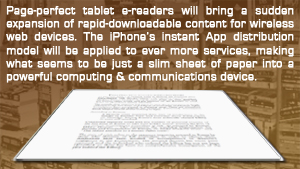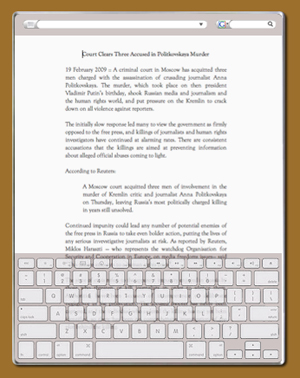Tuesday, March 03, 2009
Playing for Change
http://playingforchange.com
Tech Talk: Great Article about Future e-book Readers
Page-perfect Touchscreen e-Reader will Revolutionize Mobile Computing
by J.E. Robertson from:
3 March 2009 :: by J.E. Robertson
 The Amazon Kindle is a nice device, and it handles its job well, but it is just a very clumsy start to what will be a technological convergence few in mainstream media (and publishing) are anticipating, though it may not be far off. The page-perfect, for lack of a better term, e-reading device will make portable electronic reading easier and more comfortable than ever, packing huge amounts of data, as well as wireless downloading and even browsing capability, into an ultrathin tablet touchscreen.
The Amazon Kindle is a nice device, and it handles its job well, but it is just a very clumsy start to what will be a technological convergence few in mainstream media (and publishing) are anticipating, though it may not be far off. The page-perfect, for lack of a better term, e-reading device will make portable electronic reading easier and more comfortable than ever, packing huge amounts of data, as well as wireless downloading and even browsing capability, into an ultrathin tablet touchscreen.
The device may, after one or two initial iterations, come to have the computing power of today’s less expensive laptop computers, and will capitalize on the great discoveries in user-interface technology that have emerged from the introduction of the iPhone into the mainstream consumer market.
Whether it will belong to Apple, or be the next generation of the Amazon Kindle, or whether an as-yet-unknown pioneer in consumer electronics will pull it off, e-paper technology is certainly advanced enough to make it possible, and it’s just a matter of time until someone figures out the best way to market such a product, building on the success of the Kindle, the iPhone, the inexpensive streamlined netbook, and ever more available flat-rate unlimited mobile web services.
 What is happening right now in the investigation of e-paper technology, at MIT especially, is promising in the extreme, warranting enthusiasm about great leaps in speed and ease of use, as computing circuitry advances to make the tactile e-paper device more like a fully-functional touchscreen.
What is happening right now in the investigation of e-paper technology, at MIT especially, is promising in the extreme, warranting enthusiasm about great leaps in speed and ease of use, as computing circuitry advances to make the tactile e-paper device more like a fully-functional touchscreen.
What looks and feels a lot like paper and will produce ultra-sharp black-and-white text displays, will also be able to produce high-quality color and a mutable graphic-user-interface that allows for typing, searching, scrolling and all sorts of more agile file-search and manipulation. One-touch downloading and nearly full-sized qwerty-keyboard interaction will make the page-perfect tablet into a replacement for today’s netbooks.
Such a device may even use state of the art plastics and be flexible, so it can be used like a laptop when the user desires and like a tablet when more comfortable for reading. The art of the page-perfect reader will be in its ability to make the experience of reading electronic text more natural and more comfortable for the end-user, mimicking better the experience of reading a magazine or newspaper than today’s smaller-screen, reformatted reading devices.
Molecular or chemical computing advances must also be considered, as their impact on the power of ultra-thin devices cannot be overstated. The ability to pack as much computing power as today’s laptops have into a space literally millions of times smaller, with circuitry operating at the molecular level and with circuits that can process not just 16 or 32 commands simultaneously, but 1024 or 2048 or more, means far higher speeds and far less space needed.
The potential for creating impact-resistant or flex-resistant panels that display text and images with the fidelity of paper, is also advancing. What some saw as pure science fiction in the movie Minority Report, newspapers that adapt and update spontaneously, based on environment, time, and the service’s own updating schedule, will likely be one phase in the convergence of the web, news content and personal reading devices.
It will not happen tomorrow, but such levels of connected browsing and communication are possible, and will be available, possibly within a decade. Engineers of reading devices, mobile phones, and even publication networks, should take into account these many coming advances in order to best shape their projects and offerings to the desire consumers have for maximum potential portability, maximum natural feel while reading, and maximum available information, at the lowest possible cost.